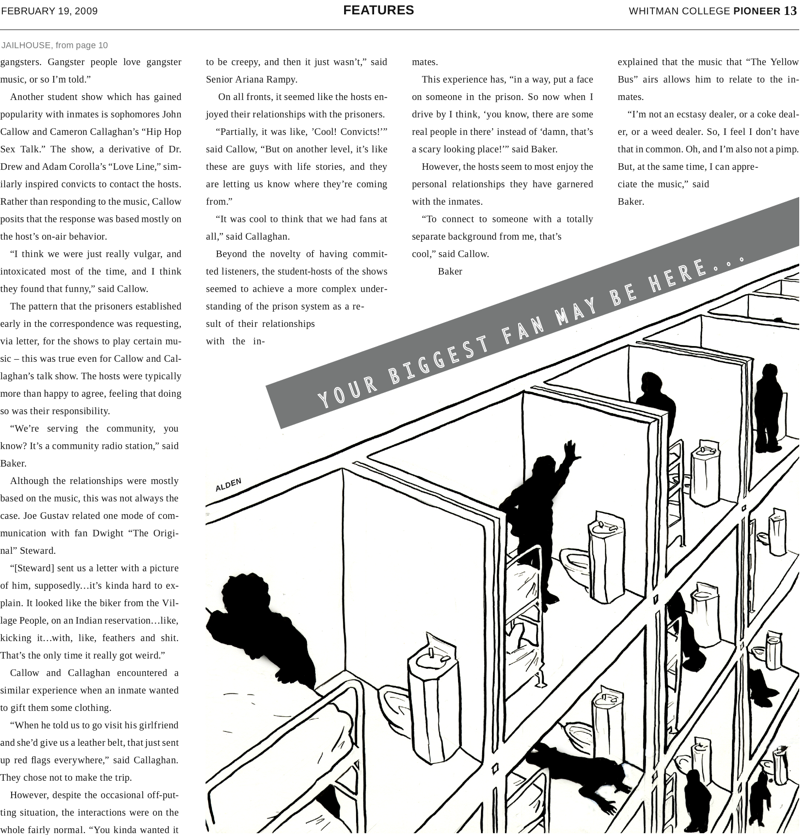This article originally appeared as part of the Featured Section of the February 19th Print edition. To see how this section looked in print click the image thumbnails below.
One hundred and twenty four years ago, Walla Walla was chosen as the site for the Washington State penitentiary. The penitentiary has struggled and grown with the rest of the nation and now stands as one of the oldest prisons in the Pacific Northwest. Despite the recession, Associate Professor of Sociology Keith Farrington believes that the penitentiary will continue to benefit the local economy.
In 2008, the penitentiary brought in $65,770,329 and provided jobs for 1,285 individuals.
“The country has decided, rightly or wrongly, to invest in this huge prison infrastructure…once you have put people away in there, you have to manage it and do something with its inhabitants,” said Farrington.
Farrington and Professor of Economics Pete Parcells worked together on a research project that looked at the social and economic impacts of the Washington State Penitentiary. They found that the penitentiary accounted for about 8% of all the jobs in Walla Walla. Due to a process called the multiplier effect, which examines how people spend their salaries, the penitentiary’s impact on the local economy is even greater.
“The concept of the multiplier effect looks at the indirect relationship between a salary and how it affects the economy when that money is spent again and again in the community,” said Parcells.
According to Parcells, with this effect in mind an income of 1 million dollars may multiply in the economy to the extent of 2 to 3 million dollars, which is why each salary from the penitentiary is crucial to the greater economy as well as to the individual recipient.
“People tend to believe that prisons are pretty much recession proof,” said Farrington.
Recently, however, the penitentiary has been forced to lay off 77 correctional officers and eight sergeants as a result of the statewide economic crunch.
“On the one hand, the recent job cuts could suggest that maybe prisons are not as recession proof as they appear. It’s certainly a big hit to the 85 workers that don’t have jobs anymore and their families. On the other hand, the way this situation played out also shows that on a scale of the different occupations that are laying off people in these difficult times, correctional officers still have a little bit more leverage,” said Farrington.
In comparison to other struggling businesses in the community and nationwide, prison systems in general are far less likely to close down.
“The dynamics are hugely different between the penitentiary and various private businesses that are downsizing and closing up in town,” said Farrington. “The existence of the prison is mandated by the state, it exists and has been established and defined as performing a critical function for the state…[That] takes away the option to say that you can’t do this any longer and to close up shop.”
Only a small minority of the Walla Walla population feels that the penitentiary has a negative impact on the town, according to a study conducted by Farrington and Whitman alumna Hannah Sherrard, which explored perceptions of the penitentiary and the wine industry.
In their study, “almost three quarters of our respondents (71.6%) agreed that WSP [Washington State Penitentiary] is a basic cornerstone of the economy of Walla Walla, and a very similar percentage (70.3%) shared the belief that the economic stability of Walla Walla would be much less than it is at present if it were not for the presence of the Washington State Penitentiary in our community.”
The penitentiary has formed a kind of symbiotic and well defined relationship with the town. Entire family lines have worked for or are somehow connected to the penitentiary, providing economic stability to the entire community.
“We are always going to have lots of people sent to prison, and jobs for the folks who have to watch over them.”







